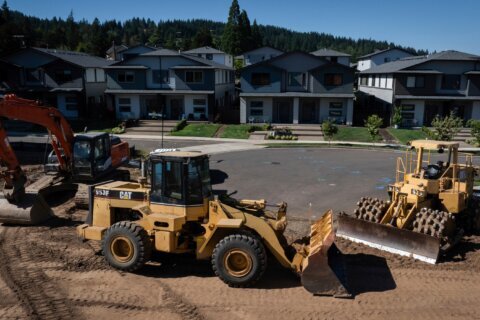You’ve reconciled your income with how much of a mortgage you can afford, set aside enough money for a down payment you feel comfortable with and calculated everything you’ll need to pay for closing costs and movers. You’re ready to buy a home at last.
But before you do, consider adding even more to that mountain of money you’ll need before closing. All homebuyers should have additional savings set aside for home maintenance and repair emergencies, and they should continuously contribute to the fund, says Tamara Lee, communications manager and educator for OnTrack WNC, a nonprofit financial education and counseling organization based in Asheville, North Carolina.
“Set aside 1 percent of the value of the home on an annual basis,” Lee advises. “That’s something we stress pretty heavily, and then we also have them practice budgeting that in.”
At the end of January, the median price of homes listed in the U.S. was $256,000, according to real estate information company Zillow. If your home is similarly valued and you follow the 1 percent rule, you’ll want to save just over $2,500 every year.
Buying a home that is significantly more or less will affect the amount you need to save. For example, buying a $1 million house means you should save an extra $10,000 per year to ensure you won’t be financially strapped in the event of a major system failure at home.
Depending on the type and condition of the home, you may need to have an even larger percentage of the price of your home on hand. A house that’s older or has more deferred maintenance will likely require more savings to account for the greater possibility that the furnace, roof or plumbing will need work — possibly at the same time.
[Read: How to Get Along With Your Contractor.]
Knowing you need to keep an extra stack of cash in the bank and having it are, of course, two different things. Here are three tips to help you build that additional savings before you buy your home, and how to use the money wisely after the purchase is complete.
Practice saving more. First-time homebuyer boot camps and housing counselors often instruct clients to adjust their monthly finances like they’ve already purchased a house to get a feel for the difference between rent and combination of bills, mortgage and potential savings to avoid a financial shock.
“What’s it like to save an additional $150 a month? Going forward, is that something that’s doable, workable?” Lee says.
If your rent is less than the total amount you’ll be paying for your mortgage, utilities and maintenance savings, start putting that additional amount away now. “Let’s see if you can practice paying that difference on a monthly basis, in addition to that set-aside amount we discussed for the next six months and see how that feels to your budget,” Lee says.
Lee adds that clients often discuss specific homeownership and savings scenarios with a housing counselor at OnTrack WNC. Individual counseling options are available at housing counseling agencies approved by the U.S. Department of Housing and Urban Development, which includes OnTrack WNC. You can find the nearest counseling agency by visiting HUD’s website.
[Read: How to Overcome Challenges as a Second-Time Homebuyer.]
Know what you’re walking into. If you pay close enough attention, you shouldn’t come across too many maintenance surprises in your first year of homeownership.
The home inspection during the due diligence period of your home purchase should be able to tell you what systems are likely to fail first. While the inspection may note that the roof is currently in OK condition, for example, the report may also note that at 28 years old, it will likely need replacement in the next two years.
With this information, you know you’ll need more than a rainy-day fund of $2,500. A new roof installation costs $7,271 on average in the U.S., according to HomeAdvisor.
Lee says OnTrack WNC’s homebuyer classes bring in a home inspector to walk prospective buyers through an inspection report, explaining what to keep an eye out for and what questions you should ask the inspector to know more about the home you’re about to buy.
When you’re able to plan for what systems will need replacement and when, you also have the opportunity to research materials, contractors and make a decision that works for your budget in the long run.
More often than not, a furnace will break down on a particularly cold weekend, and an unprepared buyer will resort to hiring the company that can come out the fastest and install the cheapest heating replacement in the shortest amount of time, says Kyle Murray, director of marketing at Bosch Thermotechnology.
“They’ll put in a cheap furnace that the contractor recommended and not think about getting a high-efficiency furnace,” he says, noting the cheapest option can increase your bills and need to be replaced sooner.
[See: Don’t Call the Handyman: 9 Quick Fixes You Can Do Yourself.]
Have a game plan. There’s almost always something that could be repaired, improved or updated in a home, and it’s good to operate with a to-do list rather than rushing for emergency repairs when everything fails.
Then when a real emergency happens that you couldn’t have prevented, like a burst pipe during a deep freeze, you know you can delay that dishwasher replacement to ensure you have extra funds to cover the deductible on your homeowners insurance claim to make the repairs.
To reduce the number of annual surprises, Murray says regular maintenance on major systems is necessary, particularly for your heating and cooling system. “It’s the maintenance, the changing of the parts that need it and doing a yearly tuneup,” he says.
As the homeowner, you can also reduce the number of emergencies by doing seasonal maintenance around the interior and exterior of a house, like cleaning out the gutters, clearing the dryer vents and changing furnace filters. With regular maintenance, that home maintenance emergency fund will be able to grow organically, and you won’t feel the same impact on your savings when a disaster occurs.
More from U.S. News
6 Home Renovations You Think Will Pay Off — But Won’t
Why You Should Rethink Your Kitchen or Bathroom Remodel
5 Reasons Owning a House Isn’t as Good as Cash in the Bank
Why You Need an Extra $2,500 on Hand Once You’ve Bought a House originally appeared on usnews.com






